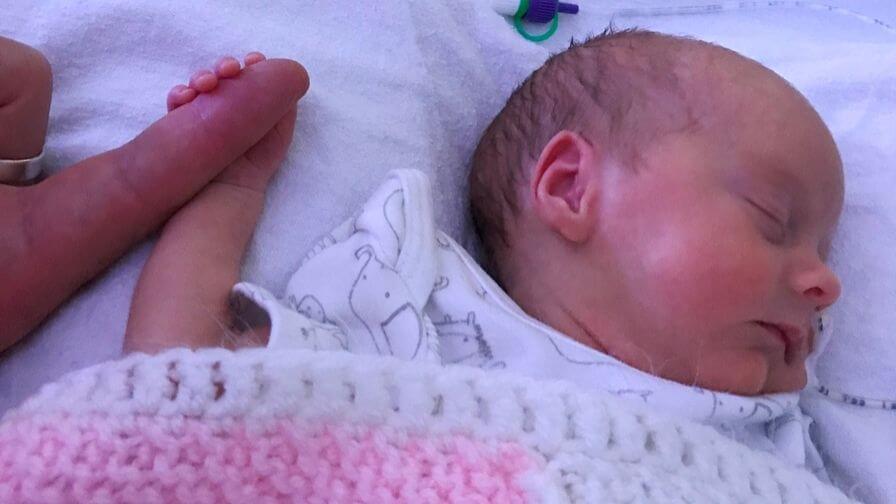Archived
Please note, this page may contain outdated information or subject matter.

Each year, around 60,000 babies in the UK are born preterm and sadly more than 1,000 babies die as a result1-5. Children who survive can experience lifelong disabilities such as cerebral palsy, learning difficulties, blindness and hearing loss.
Despite being the single biggest cause of neonatal death in the UK6, premature birth remains an underfunded and overlooked area of research.
Children’s charity Action Medical Research and premature birth research charity Borne are pleased to announce their continued working together and investment of over £1 million through joint funding of a further two research projects, as well as future funding of projects to help identify the causes behind prematurity and find ways to prevent it.
The two charities joined forces back in 2017 when they pledged to work together to help babies born too soon and attract more funding to this vital area of research. The two charities are now jointly funding four projects at a total of £591,589 to help further our understanding of why babies are born prematurely, diagnose women for their risk of preterm labour early in their pregnancy, and develop new treatments to help reduce the numbers of babies being born too soon. The four projects are:
- Reducing the risk of preterm birth
Led by Professor Michael J Taggart at the Institute of Genetic Medicine, Newcastle University
- Identifying risks and improving pregnancy care in childhood cancer survivors
Led by Dr Melanie Griffin at the Academic Department of Obstetrics and Gynaecology, University Hospitals Bristol NHS Foundation Trust
- Developing a new test to identify women at risk of premature birth
Led by Professor Rachel M Tribe at the Department of Women and Children’s Health, St Thomas’ Hospital, King’s College London
- Preventing brain injury in premature babies
Led by Professor Donald M Peebles at the Department of Maternal and Fetal Medicine, Institute for Women’s Health, University College London
In addition to these four projects, Action Medical Research and Borne are also teaming up to fund more project grants in 2020 from across the UK, with up to £500,000 available for translational research into the causes of preterm birth in order to develop diagnostic, treatment and prevention strategies to reduce the rates of prematurity.
Applications will be considered through the Action Medical Research peer review system with the closing date for outline applications will be the 20 November 2019. Applications for co-funded projects will need to meet the remit and guidelines on the Action Medical Research website.
References
- Vital statistics in the UK: births, deaths and marriages - 2018 update: https://www.ons.gov.uk/peoplepopulationandcommunity/populationandmigration/populationestimates/datasets/vitalstatisticspopulationandhealthreferencetables [website accessed 13 June 2019]
- National Institute for Clinical Excellence: Preterm labour and birth final scope, April 2013: https://www.nice.org.uk/guidance/ng25/documents/preterm-labour-and-birth-final-scope2
- Office for National Statistics. Childhood mortality in England and Wales 2017, Table 6: http://www.ons.gov.uk/peoplepopulationandcommunity/birthsdeathsandmarriages/deaths/datasets/childmortalitystatisticschildhoodinfantandperinatalchildhoodinfantandperinatalmortalityinenglandandwales [website accessed 24 June 2019]
- National Records for Scotland. Section 4: Stillbirths and Infant deaths 2017: https://www.nrscotland.gov.uk/statistics-and-data/statistics/statistics-by-theme/vital-events/general-publications/vital-events-reference-tables/2017/section-4-stillbirths-and-infant-deaths [website accessed 24 June 2019]
- Northern Ireland Statistics and Research Agency. Registrar General Annual Report 2017 – Stillbirths and Infant Deaths: https://www.nisra.gov.uk/publications/registrar-general-annual-report-2017-stillbirths-and-infant-deaths [website accessed 24 June 2019]
- National Institute for Health and Care Excellence (NICE). Preterm labour and birth, November 2015 (updated August 2019). https://www.nice.org.uk/guidance/ng25/chapter/context Accessed 01 October 2019.
-END-
Notes to Editors
Premature birth is the leading cause of mortality in children under the age of 5 worldwide. Yet we often do not know why it happens and how to prevent it. Action Medical Research and Borne aim to attract the best scientific talent and support high quality research in this underfunded and overlooked area.
For more information on Action Medical Research:
Kate Lee, Research Communications Officer, on:
T: 01403 327445
E: klee@action.org.uk
W: action.org.uk
Follow us on Twitter at @actionmedres and @amr_events
Like our Facebook page at facebook.com/actionmedres
Follow us on Instagram at @actionmedres and @actionevents
Action Medical Research is a leading UK-wide charity saving and changing children’s lives through medical research. For more than 65 years we’ve helped pioneer ways to prevent disease and develop treatments benefiting millions of people. Our research has helped to beat polio in the UK, develop ultrasound in pregnancy, fight meningitis and prevent stillbirths. But we urgently need to develop more new treatments and cures for sick babies and children and we can’t do it without you.
Join our fight for little lives today.
Charity reg. nos 208701 and SC039284
For more information on Borne:
Sophie Drouet, Marketing and Communications Manager on:
T: 07909 254491
E: sophie@borne.org.uk
W: borne.org.uk
Follow @BorneCharity on Instagram, Facebook and Twitter
Borne is a medical research charity working to identify the causes of premature birth. We bring scientists and doctors together to advance our understanding of pregnancy, and to find effective ways to screen women at risk of preterm birth and develop new treatments to prevent it. We believe every child should have the chance of a full and healthy life, unaffected by disability. A baby’s first hours should not be its hardest, or its last.
Help us find answers to premature birth.
Registered charity no. 1167073
